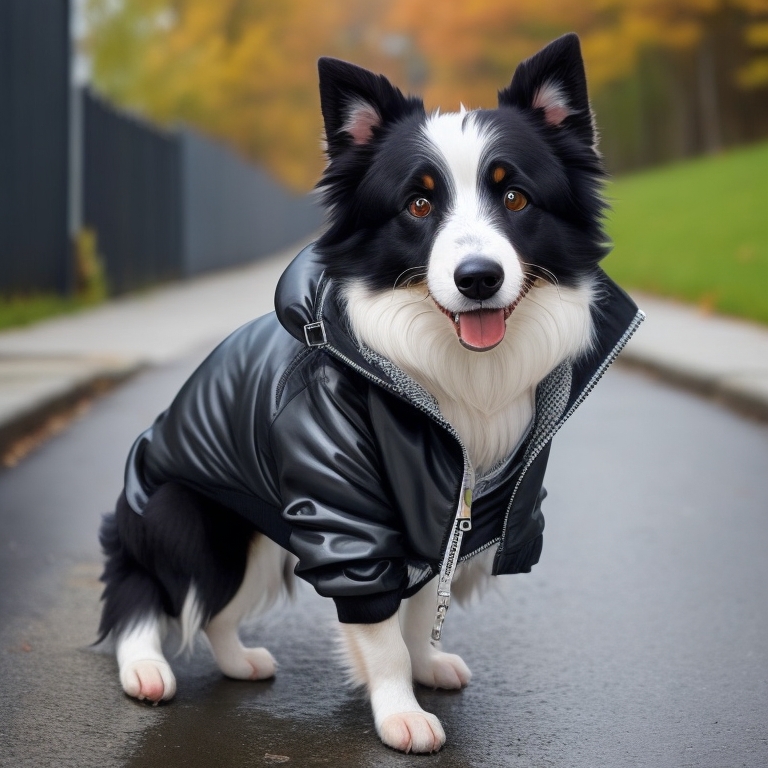How Much Should a Border Collie Eat?
As a Border Collie owner, you want to ensure that your furry friend is getting the right amount and type of food to maintain optimal health. However, with so many options available, it can be challenging to determine how much your Border Collie truly needs.
The truth is, several factors come into play, such as size, age, activity level, and more.
In this article, I’ll guide you through the nutritional requirements of Border Collies and provide tips on how to determine the right amount of food to feed them for a healthy and happy pup.
| Border Collie’s Weight | Recommended Daily Intake |
|---|---|
| 10 lbs | 0.75 – 1 cups |
| 20 lbs | 1.25 – 1.5 cups |
| 30 lbs | 1.75 – 2 cups |
| 40 lbs | 2.25 – 2.5 cups |
| 50 lbs | 2.5 – 3 cups |
| 60 lbs | 3 – 3.5 cups |
Understanding the Nutritional Requirements of Border Collies
Factors that Affect a Border Collie’s Nutritional Needs
Several factors impact the nutritional needs of a Border Collie. Size and weight play a vital role in determining the appropriate amount of food to be consumed.
Age comes into play as older dogs generally require less food than young ones.
Similarly, the activity level of a Border Collie dictates how much food they should eat. Lastly, neutered or spayed dogs have different nutritional requirements than their unaltered counterparts.
It’s essential to consider these factors while deciding how much food a Border Collie should eat.

Macronutrients Needed by a Border Collie
To keep your Border Collie healthy, it is crucial to provide them with the right balance of macronutrients- protein, fats, and carbohydrates – in their diet. Protein is vital for muscle development, and sources such as chicken, fish, and beef provide the necessary amino acids for healthy growth and maintenance.
Fats provide energy and contribute to healthy skin and coat.
Incorporate sources like fatty fish, eggs, and plant-based oils in your Border Collie’s diet, but ensure they are not consuming too much. Carbohydrates supply energy and can be found in whole grains, vegetables, and fruits.
They also provide fiber, vitamins, and minerals.
Including a balanced mix of these macronutrients in your Border Collie’s diet is crucial. Consult with a veterinarian or a professional nutritionist to ensure your furry friend’s dietary needs are met.

How to Determine the Right Amount of Food for a Border Collie
Calculating Caloric Needs of a Border Collie
To determine the right amount of food for your Border Collie, you need to calculate their caloric needs. First, determine their Resting Energy Requirements (RER) by using their weight in kilograms raised to the power of 0.75 and then multiply that number by 70.
This will give you their RER in kilocalories per day.
Next, determine their Maintenance Energy Requirements (MER) by multiplying their RER by appropriate factors based on their activity level, which ranges from sedentary to highly active. For example, a sedentary Border Collie would have an MER of RER x 1.2, while a highly active Border Collie would have an MER of RER x 4.0. Once you have their MER, you can feed your Border Collie accordingly.
However, keep in mind that factors such as age, weight, and spay/neuter status can also affect their caloric needs.
It’s important to consult with your veterinarian to determine the best feeding plan for your Border Collie. Calculating your Border Collie’s caloric needs helps ensure they receive the right amount of food to maintain a healthy weight and avoid obesity-related health issues.
So make sure to calculate their RER and MER to determine the perfect amount of food for your furry friend.

Portion Control for a Border Collie
To maintain a healthy weight, it’s essential to practice portion control for your Border Collie. Here are some tips to determine the right amount of food for your furry friend:
– Measuring Food: Use a measuring cup to determine the amount of food to serve. Follow the recommended serving size on the food packaging or consult with your vet to determine the precise amount for your Border Collie’s needs.
– Feeding Schedule: Divide your Border Collie’s daily recommended food intake into two or three small meals to avoid overeating. Regular feeding times will help your Border Collie maintain a consistent weight and avoid bloat.
By implementing these portion control practices, you’ll ensure that your Border Collie receives the right amount of nutrition and maintains a healthy weight.

Choosing the Right Type of Food for a Border Collie
Commercial vs. Homemade Food
When deciding what to feed your Border Collie, you may be considering whether to use commercial or homemade food. Let’s take a closer look at the pros and cons of each.
Commercial Food: Pros:
- Convenient and widely available
- Nutrient content is regulated and consistent
- Wide variety of options for different dietary needs
- May contain supplements not found in homemade food
Cons:
- May contain unnecessary fillers and preservatives
- Quality varies widely among brands
- More expensive than homemade food
- Packaging and processing may negatively impact the environment
Homemade Food: Pros:
- More control over ingredients and quality
- Potentially fresher and less processed
- Can be tailored to your dog’s specific dietary needs or preferences
- Can be a more sustainable option
Cons:
- More time-consuming and may require more preparation
- Can be difficult to ensure proper nutrient balance
- May not contain necessary supplements or vitamins
- Risk of contamination or incorrect preparation
Ultimately, the decision between commercial and homemade food comes down to personal preference and your dog’s particular needs. Consider consulting with your vet or a canine nutritionist to determine the best option for your Border Collie.
Decoding Dog Food Labels
One of the biggest challenges for pet owners is deciphering the information on a pet food label. It’s critical to understand the ingredients listed to ensure that your Border Collie is getting the appropriate and necessary nutrients.
Here are some helpful tips for understanding and decoding dog food labels: Ingredients to Look for:
- Protein sources that top the ingredient list like chicken, beef, lamb, or fish
- Whole ingredients such as whole grains, fruits, and vegetables
- Natural preservatives such as tocopherols and citric acid
- Vitamins and minerals including vitamins A, E, D, and K, and minerals like calcium and phosphorous
Ingredients to Avoid:
- Meat by-products or meal or listed as “mystery meat”
- Artificial ingredients or preservatives such as BHA, BHT, and ethoxyquin
- Fillers such as soy, corn, and wheat
- Added sugars or artificial sweeteners
By paying attention to the ingredients in your dog’s food, you can make informed decisions about the type of food you are feeding your Border Collie. This is critical in ensuring they receive the necessary nutrients for optimal health.

Tips for Feeding Your Border Collie
Specialty Foods for Border Collies
Feeding your Border Collie with specialty foods can help address specific health concerns that they may have. Here are some specialty foods that you may consider:
- Senior Border Collies: As border collies age, their metabolism slows down, and their nutritional needs may change. Senior-specific dog food contains lower fat content to help maintain their weight and promote healthy digestion.
- Border Collies with Health Issues: Some border collies may have allergies, sensitive stomachs, or other health issues. There are specific dog food formulas that cater to their needs, such as those with limited ingredient diets or grain-free options.
Feeding your Border Collie with specialty food can provide them with the necessary nutrients to keep them healthy and happy. However, make sure to consult with your veterinarian first before switching to a new diet.
Avoiding Overfeeding and Obesity in Border Collies
Overfeeding can lead to obesity, which is a common issue in Border Collies. To avoid this, it’s crucial to monitor their food intake and provide enough exercise.
Here are some tips for preventing overfeeding and obesity in your Border Collie:
- Measure their food: Use a measuring cup to ensure that you’re providing the appropriate amount of food for your Border Collie’s size, activity level, and age. Avoid free-feeding, which means leaving food out all the time.
- Stick to a feeding schedule: Establish a regular feeding schedule and stick to it. This will help your Border Collie regulate their eating habits and prevent them from overeating.
- Provide enough exercise: Exercise is essential for maintaining your Border Collie’s weight. Make sure they get enough daily exercise to burn off calories and prevent weight gain.
- Monitor their body condition score: Regularly check your Border Collie’s body condition score to ensure that they’re at a healthy weight. Observe their waistline and ribs. If you can’t feel their ribs or see their waistline, they may be overweight.
By following these tips, you can help prevent overfeeding and obesity in your Border Collie, which promotes a healthy and happy life.
Conclusion
Providing the right amount of nutrition for your Border Collie is key to ensuring their health and well-being. Consider the factors that affect their specific nutritional needs, such as size, age, activity level, and whether they are neutered/spayed.
Use the RER and MER formulas to calculate their caloric needs and portion control their food to keep them at a healthy weight.
When selecting a type of food, weigh the pros and cons of commercial versus homemade food options, and carefully read dog food labels to ensure you are providing your pup with the nutrients they need. Keep in mind that specialty foods may be necessary for senior Border Collies or those with health issues.
Lastly, make sure to avoid overfeeding and monitor their body condition score through exercise and regular vet check-ups.
By providing the right amount and type of food, you can guarantee that your Border Collie will live a long and happy life.







